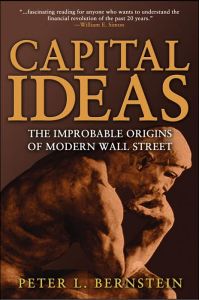Join getAbstract to access the summary!

Join getAbstract to access the summary!
Peter L. Bernstein
Capital Ideas
The Improbable Origins of Modern Wall Street
Wiley, 2005
What's inside?
Assemble the great economists to guide your stock portfolio: Keynes, Sharpe, Samuelson, Markowitz, Fama, Williams, Black.
Recommendation
To cover a heady topic – the origins of 20th-century financial and economic thought – Peter L. Bernstein has produced a personal, comprehensive overview of the people and ideas that shaped modern finance. Great ideas have their own lives and Bernstein shows how the intellectual paths to Wall Street intertwined wonderfully. As the head of an investment firm and the editor of a major scholarly financial journal, Bernstein was in the right place to follow the chief academic papers and meet many of their authors. He supplies the necessary anecdotes, personal contacts, background and experiences to make these academician’s ideas into interesting tales, though many of these concepts are very arcane. This is a great book for anyone who wants to know more about the theories and insights that propel modern capital markets. getAbstract considers it essential for serious finance students, corporate-finance professionals and dedicated investors who want to know what some of the field’s greatest minds have wrestled with over the years. Be forewarned: This book does not contain any easy-to-implement investment advice, but its ideas could be worth millions.
Summary
About the Author
Peter L. Bernstein is a foremost financial writer and the author of bestsellers, including Against the Gods and The Power of Gold. He is the president of Peter L. Bernstein, Inc., an investment consulting firm, and a founding editor of the Journal of Investment Management.





















Comment on this summary